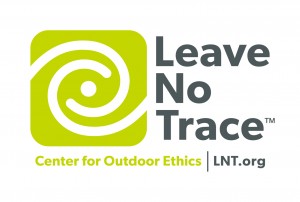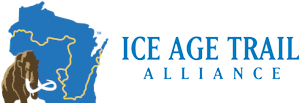Help us preserve and protect the natural beauty of Wisconsin by following Leave No Trace ethics when you are on the Ice Age Trail. These guidelines  help decrease the damaging impact we have so everyone may enjoy the Ice Age National Scenic Trail at its best.
help decrease the damaging impact we have so everyone may enjoy the Ice Age National Scenic Trail at its best.
Plan Ahead and Prepare
- Call for trail conditions. Carry maps.
- Know the regulations of the area and plan or reserve your overnight camping.
- Minimize group size – limit groups to 20 people on day hikes and 10 for overnight trips.
Travel and Camp on Durable Surfaces
- Durable surfaces include established trails and campsites, rock, gravel, dry grasses or snow.
- Stay on the trail at all times. Do not cut switchbacks. Walk in a single file in the middle of the trail, even when it’s wet or muddy.
Dispose of Waste Properly
- Pack it in, pack it out. Don’t bury, burn or leave any garbage or leftover food. Inspect your campsite and rest areas for trash or spilled food before leaving.
- Dig a 6-inch-deep cat hole at least 200 feet from trails or water to bury human waste. Cover and disguise the cat hole when finished.
- Pack out toilet paper and all feminine hygiene products.
- Minimize use of soap, and avoid using it within 200 feet of water sources. Sand makes an excellent scrubber. Use biodegradable soap and scatter strained gray water at least 200 feet away from water sources.
Leave What You Find
- Take only photos and leave only footsteps. Do not pick flowers, plants or bark off trees.
- Preserve the past. Observe, but do not disturb or take historical artifacts and historical or cultural structures. Do not build structures or furniture or dig trenches.
Minimize Campfire Impacts
- Make low impact fires at existing fire rings only and use only downed wood.
- Douse fires thoroughly before breaking camp. Never leave a fire unattended.
- Use a portable stove for cooking instead of a campfire.
Respect Wildlife
- Store food and trash securely to avoid rodents or bears. Do not eat in or around your sleeping area. Hang your food properly in bear country.
- Observe wildlife from a distance. Do not follow or approach animals. Do not damage their habitat.
- Never bait or feed wild animals. Feeding wildlife damages their health, alters natural behaviors and exposes them to predators and other dangers.
Be Considerate of Other Visitors
- Keep a low profile. Where primitive camping is permitted, camp off trail, at least 200 feet from lakes and waterways, and out of sight of developed areas. Good campsites are found, not made. Altering a site is not necessary.
- Let the sounds of nature prevail; avoid loud voices and noises.
- Be courteous and yield to other users on the trail.
This information is copyrighted and has been reprinted with permission from our partner, the Leave No Trace Center for Outdoor Ethics.
